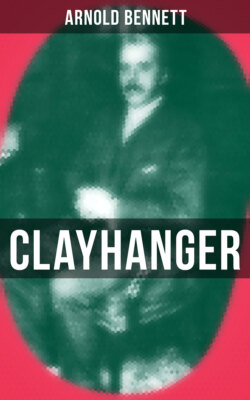Читать книгу CLAYHANGER - Arnold Bennett - Страница 5
На сайте Литреса книга снята с продажи.
Two.
ОглавлениеEdwin, with his elbows on the stone parapet of the bridge, stared uninterested at the spectacle of the child, the whip, and the skeleton. He was not insensible to the piquancy of the pageant of life, but his mind was preoccupied with grave and heavy matters. He had left school that day, and what his eyes saw as he leaned on the bridge was not a willing beast and a gladdened infant, but the puzzling world and the advance guard of its problems bearing down on him. Slim, gawky, untidy, fair, with his worn black-braided clothes, and slung over his shoulders in a bursting satchel the last load of his schoolbooks, and on his bright, rough hair a shapeless cap whose lining protruded behind, he had the extraordinary wistful look of innocence and simplicity which marks most boys of sixteen. It seemed rather a shame, it seemed even tragic, that this naive, simple creature, with his straightforward and friendly eyes so eager to believe appearances, this creature immaculate of worldly experience, must soon be transformed into a man, wary, incredulous, detracting. Older eyes might have wept at the simplicity of those eyes.
This picture of Edwin as a wistful innocent would have made Edwin laugh. He had been seven years at school, and considered himself a hardened sort of brute, free of illusions. And he sometimes thought that he could judge the world better than most neighbouring mortals.
“Hello! The Sunday!” he murmured, without turning his eyes.
Another boy, a little younger and shorter, and clothed in a superior untidiness, had somehow got on to the bridge, and was leaning with his back against the parapet which supported Edwin’s elbows. His eyes were franker and simpler even than the eyes of Edwin, and his lips seemed to be permanently parted in a good-humoured smile. His name was Charlie Orgreave, but at school he was invariably called “the Sunday”—not “Sunday,” but “the Sunday”—and nobody could authoritatively explain how he had come by the nickname. Its origin was lost in the prehistoric ages of his childhood. He and Edwin had been chums for several years. They had not sworn fearful oaths of loyalty; they did not constitute a secret society; they had not even pricked forearms and written certain words in blood; for these rites are only performed at Harrow, and possibly at the Oldcastle High School, which imitates Harrow. Their fellowship meant chiefly that they spent a great deal of time together, instinctively and unconsciously enjoying each other’s mere presence, and that in public arguments they always reinforced each other, whatever the degree of intellectual dishonesty thereby necessitated.
“I’ll bet you mine gets to the bridge first,” said the Sunday. With an ingenious movement of the shoulders he arranged himself so that the parapet should bear the weight of his satchel.
Edwin Clayhanger slowly turned round, and perceived that the object which the Sunday had appropriated as “his” was the other canal-boat, advancing from the south.
“Horse or boat?” asked Edwin.
“Boat’s nose, of course,” said the Sunday.
“Well,” said Edwin, having surveyed the unconscious competitors, and counting on the aid of the whipping child, “I don’t mind laying you five.”
“That be damned for a tale!” protested the Sunday. “We said we’d never bet less than ten—you know that.”
“Yes, but—” Edwin hesitatingly drawled.
“But what?”
“All right. Ten,” Edwin agreed. “But it’s not fair. You’ve got a rare start on me.”
“Rats!” said the Sunday, with finality. In the pronunciation of this word the difference between his accent and Edwin’s came out clear. The Sunday’s accent was less local; there was a hint of a short “e” sound in the “a,” and a briskness about the consonants, that Edwin could never have compassed. The Sunday’s accent was as carelessly superior as his clothes. Evidently the Sunday had some one at home who had not learnt the art of speech in the Five Towns.
